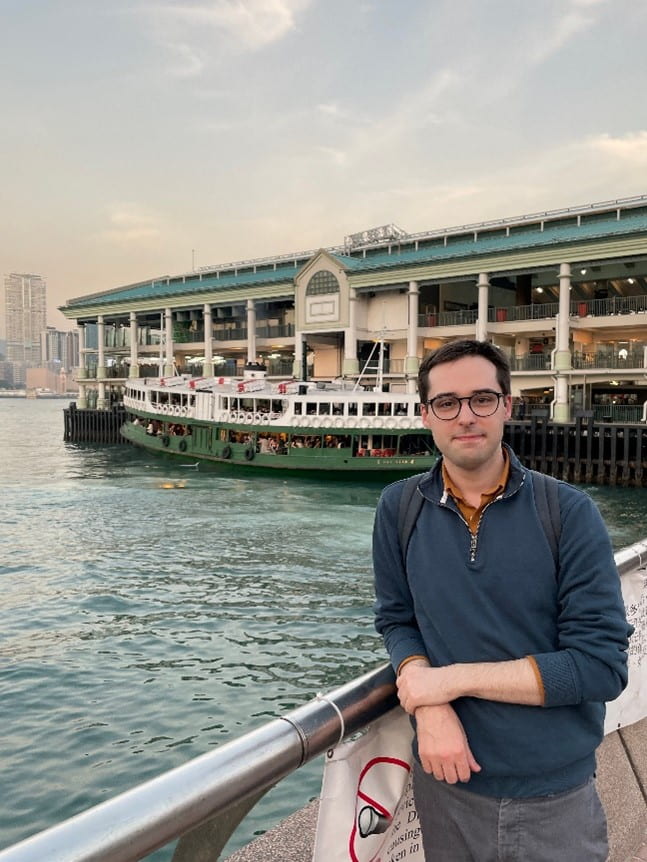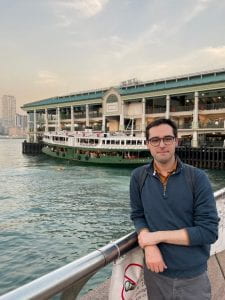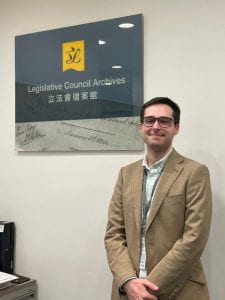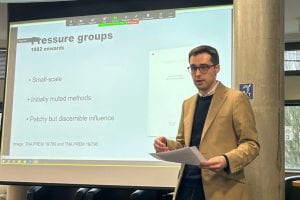
One of the Centre’s missions is to nurture a new generation of Hong Kong historians.
An Early Career Scholar Network was created under the Hong Kong History Centre in June 2023. It is intended to help create a community of Hong Kong historians and offer a platform for face-to-face interaction and academic exchange among young scholars. Research students and fresh doctoral graduates working on socioeconomic, political and cultural history of Hong Kong and its global relevance are welcomed. We usually meet thrice a year (February, June and October) with participants taking turn to present their works in each meeting. Financial support is provided for our network members attending these sessions.
Please write to Prof. Ray Yep, Research Director of Hong Kong History Centre, at rekmy@bristol.ac.uk, if you are interested in joining this Network.
——
In this post, we would like to introduce Matthew Hurst, a member of the Network.
Matthew Hurst is a PhD student in University of York. In the note written by him below, he shares with us his reflections on his academic journey and current project.
****
On many occasions over the past ten years, when I have sought to study Hong Kong I have ended up sidetracked looking at British colonial officials or mainland China instead. I have been disappointed to find that Hong Kong is rarely at the centre of enquiry for itself. This is why Bristol’s Hong Kong History Centre – and a handful of other Hong Kong-focused initiatives that have sprung up in recent years – is timely and crucial: it makes Hong Kong its firm focus. My PhD research shares this aim. In this post, I describe how my PhD research is the culmination of a decade-long growing interest in Hong Kong.

My interest in Hong Kong began in 2014, which was also the start of my final year of undergraduate studies in Philosophy at the University of Manchester. It was then that I came to understand the direct thread between the British Empire, which ended its colonial administration in 1997, and contemporary Hong Kong. The British school curriculum is thin on the British Empire and I wondered: As a Brit, why did I know so little about the Empire’s global legacy? How did the legacy of the Empire continue to reverberate across the world today? And how much of Hong Kong’s present was a consequence of its colonial past?
My graduation from undergraduate studies in 2015 coincided with the heralded ‘Golden Era of UK-China Relations’. The British government (and other governments across the world) were determined to grow their links with China. Company after company I worked for felt there was opportunity in China and often pursued the Hong Kong market thinking it an entryway to the mainland. In the years that followed, my interactions with Hong Kong and China grew through work as well as travel and language classes which I took in the evenings. However, after several years I felt no closer to addressing the questions that had come to mind in 2014.
In 2019, I was briefly in Hong Kong for work. This was a galvanising experience. It was then that I felt an ever more pressing need to explore my festering questions further. I resolved then to try to understand the present by looking to the past.
With no Hong Kong Studies course in the UK, I began a Master’s in Chinese Studies at the University of Oxford in 2020. In my thesis, I examined how British and mainland Chinese officials launched the negotiations over the future of Hong Kong in the 1980s. I later developed this thesis into two papers: one is an account of the impact of Margaret Thatcher’s agency as a leader upon the British opening position and is firmly rooted in the discipline of history (doi.org/10.1080/07075332.2021.2024588, winner of the PSA Conservatism Studies Group 2022 Research Prize); the other adopts concepts and frameworks borrowed from the social sciences to analyse Beijing’s negotiation tactics (doi.org/10.1007/s12140-023-09422-8).
But something was still missing. My Master’s was in Chinese Studies; my thesis examined UK-China relations; one of my publications focused on British officials and the other on mainland Chinese officials. Despite seeking to understand Hong Kong, I had somehow left Hong Kong out of the picture.
Seeking to redress this, in my PhD research I am exploring how Hong Kong people were involved in the negotiations over the city’s future during the 1980s. I unearth this overlooked perspective by accessing a large number of archival materials in a wide range of archives, looking for documents that attest to Hong Kong people’s actions during the period (meeting records, letters, position papers, petitions, etc.). From this, I reconstruct the many visions for Hong Kong’s future that Hong Kong people put to officials and evaluate the extent of their influence upon the handover.

With this research, I aim to put Hong Kong people into the narrative of this most pivotal period which has only ever been seen as a bilateral negotiation between British and Beijing officials. I also explore the agency of local actors and their interactions with colonial officials, contributing to this growing theme within colonial and imperial history. Moreover, outside of academia, I engage with contemporary colonial nostalgia, the ongoing re-examination of the legacy of British colonialism, and local, regional and international tensions that are largely a consequence of these events in the 1980s.
My path towards researching Hong Kong for a PhD in History has been far from straightforward. It began ten years ago and has taken a strangled route: from Philosophy to film, Chinese Studies to History. Yet with my PhD research, I am – finally – addressing some of the questions that have persisted as a common thread for an entire decade.

Acknowledgements
This work was supported by the Arts & Humanities Research Council (grant number AH/R012733/1) through the White Rose College of the Arts & Humanities. This research has also benefitted from the James Jarvis Memorial Bursary (twice), The Universities’ China Committee in London Travel and Study Grant, and the British Postgraduate Network for Chinese Studies (BPCS) Postgraduate Research Scholarship.